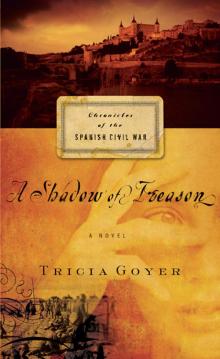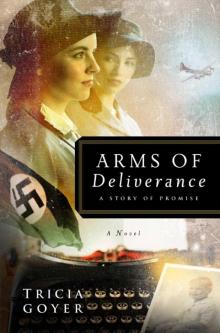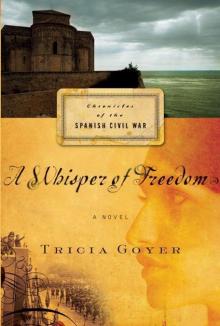- Home
- Tricia N. Goyer
Valley of Betrayal Page 4
Valley of Betrayal Read online
Page 4
By the time they'd returned to the hotel, cars and armored vehicles had parked in front of the door, and a group of armed young people stood about on the sidewalk. Their voices rose with excitement.
Philip touched the elbow of a young man, and he turned, eyes wild.
"What's happening?" Philip asked in Spanish.
"The insurgents have killed many—shooting all prisoners. Shooting our men—those who refuse to submit."
Another young man approached. "You Americans shouldn't be here. You are not safe."
"But our documents clearly state we’re here as part of the Workers' Games," Attis insisted.
"Which means we're safe as long as these people maintain control." Philip leaned in closer to Attis. "But what will happen when we travel back?"
"Sí," one of the young men added, butting in. "Last night I heard of many regions already occupied by the Nationalist rebels, Fascist pigs. I question if you can even get out of our country safely."
For the first time Philip noted worry in Attis's demeanor.
"We'll get out, somehow. Surely we won't be stuck here." Philip turned and watched as a shirtless man leaned a ladder up the front of the building and replaced the hotel's flags with a red one that displayed a hammer and sickle.
"Or maybe we’ll choose to stay." Attis placed a heavy hand on Philip's shoulder, as he always did when sharing a big announcement. Then he turned to the two young men. "Maybe destiny brought us here."
Sophie yawned and opened her eyes as they drove into a town with a white sign that read PERPIGNAN. She glanced at Walt, and her heart pounded, remembering the previous night. She'd told herself not to fall asleep. Who knew what back road she’d find herself on with this stranger? Then again, how could she determine which road was correct in the first place? Sophie had no choice but to place her trust in the man at the wheel. Entering Spain depended on it.
She ran her fingers through her hair, tugging the ends out of her collar. She tried to act just the opposite of what she felt—that traveling with a man she hardly knew, in a foreign country, and trying to sneak their way into another, much more hostile country in the midst of a revolt was something she did every day.
"We're in Perpignan?" She attempted to brush the wrinkles out of her blouse.
"Yes, this is it. And I have to say I've never heard a lady snore quite as loudly as you do. I wish I'd had a gramophone to drown out the noise."
She shot him a glance and noticed a smile curled on his lips. "Not to worry. If things go as planned, you'll be rid of me soon."
"Too bad you slept the whole time. You missed it all. Even the holy city of Lourdes. It was quite a sight by the light of the moon. All silver and mystical."
"Too bad. We could have stopped and prayed. As my grandma says, it never hurts in tough spots."
Taking a look at the scenery around the car, Sophie sat transfixed by the towering, snowcapped mountains and the quaint town. If she had an extra hour or two she would have asked Walt to pull over and let her paint. Of course, she didn't have the extra time . . . or the materials. And actually, she wasn't even in the mood for it.
Mood, she realized, mattered as much as anything when it came to art. Sometimes the image before her gathered her attention completely. She would escape into the world on her canvas, unaware that time passed. Other times she worked even in the midst of activity, tirelessly copying the bustling streets of Boston, trying to communicate the pulse of the city with the sharp lines or areas of shade on her canvas. Then there were other times she worked feverishly, as if in response to stored-up tension inside her.
Yet today the tightness of her stomach, and even a gentle ache in the pit of it, reminded her of the last time she’d eaten bad lobster on the wharf. She wouldn't have been able to paint anything in this state, even if she had all her things.
They neared the center of town, and the place was packed with people—mostly women. They looked the same as the Frenchwomen in the museum paintings with long thin, necks and sleek bodies that moved with dignity even as they performed everyday chores.
"Is it always like this?" Sophie braced herself against the door as the newspaperman hardly slowed the automobile, weaving through the crowds. He didn't answer, but as she looked closer, she spotted foreigners.
She smiled as two women with raven hair and dark olive skin rushed across the street hand in hand. In their long skirts and white blouses, they embodied the perfect image of Spain. Her heart beat even quicker. Soon they'd be there. Soon she'd be with Michael.
"The sudden influx is most likely due to the problem in Spain," Walt finally answered, his neck craning to find a parking place. "It's an easy spot for people to flee to."
"Are things really that bad? I mean, don't these types of conflicts happen all the time?"
Walt parked the car near a cluster of small houses and then turned to her, one eyebrow cocked. "Churches and buildings are burning. Men on both sides have been dragged into the streets and shot. How do you think these types of power struggles work? You can't simply walk into a town and be handed the keys to the city. From what I've read, it's a fight, all right. A real knock-down, drag-out."
Sophie turned away, glancing at a mother hurrying three small children down the street. The woman scanned their car with sad and eager eyes as she walked past, and Sophie wondered just who she was looking for.
"I'm sorry. Of course, the struggle is bad. However, I'm still determined to get over the border." She climbed out of the car.
From somewhere beyond their vision, a church bell chimed as she snatched up her suitcase. "Are you just going to leave the car here?"
"I'll be back in a week or so; no need to worry. It's safe." He grabbed his suitcase from the backseat before locking the car and pocketing the keys.
They strolled by a beautiful cathedral with a large round fountain in the courtyard. The splashing of the water calmed her some, and she reached out her hand and let the cool drops bounce off her arm. She'd come back and paint this idyllic scene. She'd bring Michael, and he could take photographs of the people as she painted.
"Hungry?" Walt rubbed his stomach. "Let's get some breakfast, and then we’re off to the border. It's a long walk."
"Can't we drive as close as possible?"
"Now that wouldn't be safe. Here, our vehicle will not draw attention. Near the border it would."
"I'll go with that, but I'd like to find a place to freshen up first." Sophie patted the side of her suitcase.
"Yes, of course." Walt chuckled. "You'll want to impress the border guards, after all."
Sweat dripped down Sophie's face from the long descent into Port-Bou. The mountains rose up so tall around the oceanside town that it seemed as if the whole place were nestled in the bottom of a cave. She held her aching side and urged her feet forward. He should have warned me, she thought as she switched the suitcase from one hand to the other. Should have prepared me for the fifteen-kilometer walk. Just how many miles is that, anyway?
Back home, she walked everywhere. Everything of importance in Boston was within walking distance, and the streets bloomed with interesting people and sites no matter how many times you strolled through them. But here the steep inclines caused her leg muscles to burn and her lungs to scream out in pain. She didn't let on, of course. Walt had set the pace and moved his thin frame over the pass with ease. She didn't want him to claim she slowed him down.
She finally caught her breath after the final steep descent, and within minutes Walt led her to the offices of the town committee. Two large flags waved over the small building, one Catalan and the other red with hammer and sickle. Outside, seated on a bench, a few peasant women waited patiently. Motioning her inside, a female guard with a pleasant face patted Sophie from her shirt cuffs to the hem of her trousers and even checked the lining of her shoes.
"Sit, please, senorita." The petite border guard studied Sophie's passport, then motioned to a chair, her face suddenly growing stern.
Sophie obliged, t
hen winced as the woman hurriedly ran her fingers through Sophie’s hair. So much for freshening up. She brushed her sweaty, now tangled, locks back from her face. Sun poured through the window in brilliant rays. Spanish sun. That small realization brought a smile to her lips.
Next the woman turned to Sophie's satchel and removed every item, placing it on the table before her. Sophie held her breath as the guard unrolled the garment bag and ran her hands over the light blue dress, but the woman paid it little attention. She returned all the items to the satchel and motioned to an adjoining waiting room.
Sophie sat on a hard wooden chair and waited for Walt, still wondering if they could pull this off. Or was she already doomed? Failure meant a trek back—which she didn't want to even think about. Or again, there might be a damp, dark prison cell. How could she have not thought of that possibility sooner?
On the desk before her, Spanish newspapers were spread out. She read the stories and studied them, realizing the reports favored the Fascist rebels—which most likely didn't put these communist-idealist border officials in a good mood.
Walt entered with a tall, black-haired man with a thin moustache.
"I am the head of the Comité. What is your business?" he asked in Spanish.
Sophie swept her hand to Walt. "This man is a journalist, señor, and I am his interpreter. We have an assignment to fulfill in Barcelona . . . and also Madrid," she quickly added.
He crossed his arms over his chest. "You should not have been allowed to pass through the border. Do you understand that you could be arrested for your attempt?" He pressed his hands on the desktop, crumpling the newspaper, and leaned toward her. "We have orders. Orders that neither your position, nationality, or sex can protect you from. You must return at once."
The man's eyes pierced hers, yet Sophie held his gaze. Seemingly impressed by her refusal to look away, he cocked one eyebrow, straightened, and turned toward the door.
Sophie's hand covered her pounding heart, and she quickly gathered up every bit of nerve she possessed. "Comrade, wait!"
He paused and turned back to her, arms crossed over his chest.
"You do not understand, señor. I was in Paris just yesterday, and every paper on the newsstands spoke about the success of Franco and Mola. The world expects them to have full control of your country in a matter of days. You need my coworker, this journalist. He is on your side. He has come to write the truth and discredit the propaganda."
The official pointed to Walt. "Let me see his identification."
She translated and handed Walt's papers over.
"And yours?"
"I'm sorry. I have only my passport. My papers . . . they are waiting for me in Barcelona." She again looked him directly in the eye.
The dark-eyed Spaniard firmly shook his head. "And you expect me to believe that nonsense? He can go, but I cannot let you through."
"But, sir, how can he write the story—know whom to interview—if he has no one who speaks the language? How will he know whom to trust?"
The man studied her face for a moment; then his expression softened. He wrote something on a piece of paper, stamped it with an official seal, and handed it to Sophie.
"This gives you permission to take the train to the news offices in Barcelona and Madrid. I will send a letter ahead to the Comité there, and they'll expect you. There is a train leaving tonight for Barcelona. After that, you must find your own way to Madrid. But I must warn you, many will find your paperwork insufficient. It is not an exaggerated truth to tell you your life is in danger. If you are accused of faking your duties, you will be shot on the spot. This is no time for games. But if you're willing to risk this, I will let you go."
"Sí. Gracias." She rose and quickly shook his hand. Then Walt did the same.
"Thank you, señor. And if I may have one more request. May I send a telegram to Madrid? They need to know when to expect us."
"Sí. Sí. Then you must get out of my hair. There is enough to worry about without such as this. But promise me, will you? Promise you'll tell the world of our fight?"
"Of course." Sophie extended her hand and shook his. "We will let the world know." And once the paperwork was in her hands, she strode through the building, refusing to look back. Refusing to let her mind rest on the knowledge that it just as easily could have gone the other way.
Walking toward the train station, under guard, Sophie realized for the first time that she'd made it.
Michael's Spain.
The town sat on a small bay, and the sun reflected off the billowing white sails of fishing boats. Tall trees lined the esplanade. Shops and restaurants overflowed with handsome people dressed in colorful clothes, and Spanish music poured from the loudspeakers overhead.
As she strolled by a bakery, she breathed in the heavy, yeasty scent. Then she smiled as a small boy ran by, kicking a can down the street, its clinking sounding like change hitting the bottom of a penny jar. It was hard to believe this was a country in conflict. It was also hard not to fall in love with this place. Sophie understood even more why it held a tether to Michael's heart.
She knew Michael had enjoyed his time in Boston—with his family and her. But even during their most intimate moments of conversation, he had seemed distracted. As he had watched the setting sun, she could see in his eyes that he longed to follow it to Spain's new morning—though he would never say such a thing aloud.
This country, in a sense, was his mistress. Sophie could either love it as he did or lose a piece of Michael's heart forever. So she had come. And she pitied that poor man from the office she’d just left who'd attempted to keep her away. Pitied him because he’d just been fooled by a silly American girl who would contribute nothing for their cause, but wished only to follow her heart.
Chapter Five
Por el árbol se conoce el fruto.
By the tree the fruit is known.
Spanish proverb
Even the busyness of Port-Bou now seemed tranquil for the mere fact that Barcelona was alive with the movement of people in motion.
The train station buzzed with excited voices of the soldiers and civilians crowded on the platforms. Most of the men wore open shirts and sandals. And even the civilians clutched rifles slung over their strong shoulders. Some spoke with fervor, moving their hands with their words. Others listened, their faces tipped in serious expressions. Lips turned downward. Eyebrows furrowed.
Walt offered a hand to help Sophie off the train. He took off his hat and wiped his brow, his face appearing too plain and young without it. "Well, I suppose this is it. I have to admit that went better than planned. Then again, I should have guessed. You hardly seem a threat."
"I'm not home free yet—I still have a train ride to Madrid. Tomorrow perhaps I can grin at my good fortune."
Walt chuckled and nodded his chin toward a group of young men on the platform. They wore neither the guns nor the serious expressions of the older guards. "Don't worry; they'll keep you safe. They fight for the people, for the Socialist cause—they treat Americans well, as they are hoping our country will come to their aid."
Sophie glanced at the faces of the young soldiers. One smiled and winked as their eyes met, and she felt heat rising to her cheeks. She quickly looked away. "Yes, well, as long as they're on the right side."
"They are."
A group of men in red-and-black armbands paraded down the street just beyond the train station. "Son of the people, your chains oppress you," they sang. "This injustice cannot go on. . . ."
"Anarchists. Their views are similar enough to the Socialist and Communist causes that they've joined together to fight the Fascists, who are attempting to gain control. Of course, if they win, the next battle they fight will be among themselves."
"Worker! Worker! You shall suffer no longer . . . no longer!" The singing continued farther away.
"It's Franco's Fascists you have to watch out for. From what I overheard on the train, there’s still fighting going on here in the city—and in M
adrid. So get to your Miguel as soon as possible. He'll keep you safe."
"Overheard?" Sophie set her satchel by her feet and planted her hands on her hips. "What did you just say? ¿Habla Espanol? Because as far as I witnessed, everyone on the train spoke Spanish."
Ignoring her rebuke with a grin, Walt motioned for a horse-cab. The dusty gray-and-white mare plodded forward, her ears perked as if picking up the excitement from the people hustling around her.
Walt tossed his small suitcase in the cab, then turned to Sophie with a grin. "Es verdad. What kind of communicator would I be if I couldn't converse with the people?" He cocked his brow. "Forgive me, por favor. I've been planning to tell you, but I didn't want to do it before we crossed the border—didn't want to hinder your acting skills. Great work in the Comité’s office, by the way."
Sophie couldn't help but laugh. "You know, either I can't read people very well, or you, my friend, are a master of deception. Thanks for your help, anyway. What can I ever do to repay you?"
More singing erupted nearer. "Arise, loyal people, at the cry of social revolution!"
Walt covered his ears with his hands. He glanced toward the singers and wagged his head. "Madre mía. What is this noise?" Then he sighed, turning back to her. "Repay me? I only wish for one thing." He pointed to her journal. "You did a wonderful likeness of me. I think my mom would be tickled if I sent that home."
Sophie blew out a sigh. "I take that back. You are 100 percent deceptive. How did you know?"
"On the train, you glanced back and then furiously started sketching. Didn't you see me smile for the picture?"
"Fine then." Sophie flipped to the page where she’d sketched his likeness. "But since I'll never see you again, I was kind of hoping to keep this." She ripped it out and handed it to Walt.
"You never know, Miss Grace," he said with a slight bow. "You never know when we might meet again."
The train whistle stirred Sophie from her sleep, and she sat up with a start, noticing that sometime in the night a soldier's coat had been thrown over her. It smelled of cheap tobacco and body sweat, yet its warmth was appreciated as was the softness of the well-worn wool. It was a nice way to end a trip that had begun with the excited political talk of the young soldiers with whom she shared the compartment.

 Shadow of Treason
Shadow of Treason Arms of Deliverance
Arms of Deliverance Whisper of Freedom
Whisper of Freedom Dawn of a Thousand Nights
Dawn of a Thousand Nights Valley of Betrayal
Valley of Betrayal